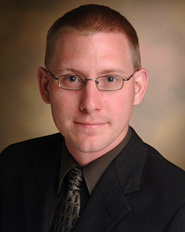
Alan Theisen (b. 4 October 1981; Port Huron, Michigan) is a Ph.D. graduate assistant in the Department of Music Theory at the Florida State University.
Composing since the age of sixteen, he has produced a steadily growing body of work distinguished by its musical energy and concentration of expression.
Representative works by Theisen include a Sonata for Alto Saxophone and Piano, Variations on a Theme of Gretchaninov, Eclogue for flute, and the Concerto for Alto Saxophone and String Orchestra (premiered by soloist Lawrence Gwozdz and the Szczecin Philharmonic in 2004). Recent compositions and commissions include Ritorno for flute and cello and a Triple Concerto. Noted composer Dimitri Terzakis commends Theisen's oeuvre as being "the product of a unique talent."
As a saxophonist, Theisen has toured the United States and Canada with the Sax-Chamber Orchestra, performing at two World Saxophone Congresses (Montreal - 2000, Minneapolis - 2003). He studied the instrument with internationally-recognized performer Lawrence Gwozdz and participated in masterclasses with famed saxophone pioneer Jean-Marie Londeix. No stranger to the podium, Theisen has been a guest conductor with several ensembles.
In an effort to showcase both his own original compositions and pieces by other contemporary composers, he founded the Intégrales New Music Festival in 2005. Now an annual event, Intégrales NMF features world-premiere performances by nationally recognized musicians. Intégrales has expanded to include musical collaborations with artists, authors, and dancers.
Theisen wrote his undergraduate thesis on György Ligeti's Piano Etudes, and has authored several papers on topics including Elliott Carter, film editing, composition as analysis, and Michael Brecker.
Other interests include mathematics, film criticism, and philosophy; in addition, Theisen has performed the role of Oberon in a production of Shakespeare's A Midsummer Night's Dream, for which he also wrote the incidental music.
Theisen lives with his wife (and puts up with their two cats) in Tallahassee, Florida.
|
|
|
|
|
|

Sunday, October 30, 2005
Sheer Joy
Mark Twain once commented that grief can take care of itself, but to get the full value of joy you must have somebody to divide it with.
I couldn't agree more. This past week has afforded me more opportunities for sheer happiness than I think I've ever had in my 24 years: 1) last Saturday, I was married to the love of my life Misty Rondeau and 2) Friday evening my best friend Everette Minchew and his wife Cheryl welcomed their first child, Asa, into the world.
To answer a few questions: Yes, my wife is a musician (a flautist, more precisely). With a (former) last name like "Rondeau", how could you not be? Yes, our first dance was to the classic ballad, "Misty".
This all makes me think. What pieces of music do I associate with joy? The first part of Mahler's Eighth Symphony, certainly. Also, the first movement of Carter's Clarinet Concerto, the last movement of Shostakovich's Sixth, finale of Mahler's Fifth, and Sur Incises by Boulez. Sure...call me crazy for that last one. But it is completely possible to associate post-tonal pieces with positive emotions. I like to think we've moved beyond the music-appreciation-classroom philosophy that 20th century music is dissonant and therefore evokes only creepy or deranged states of mind.
I must go prepare tomorrow's Halloween lecture for my class. I figured we'd analyze Michael Jackson's Thriller and Radiohead's No Surprises. How's that for putting pop music in theory class?
posted by Alan Theisen
|
| |



